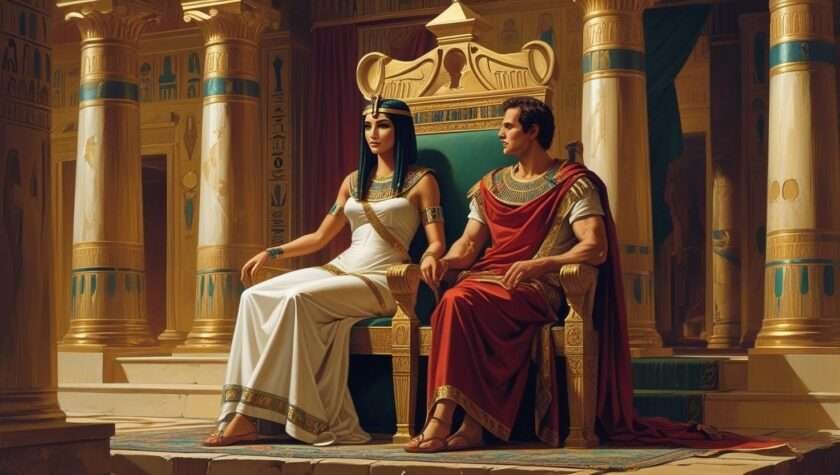The history of Egypt has been a precious chapter of world history for centuries. The greatness of the pyramids, pharaohs and ancient civilization has always attracted historians and researchers. In these historical pages, the 275 Years of Ptolemies of the Ptolemaic dynasty is a saga that has both splendor and destruction. After the death of Alexander the Great, when his empire began to break down, his commander Ptolemy took over Egypt. This began the dynastic journey that made Egypt a confluence of Greek and Egyptian culture.
The Ptolemaic rulers took art, science and trade to new heights during their reign. The famous library of Alexandria, the progress of astronomy and cultural exchange became the identity of their glorious period. But at the same time, power struggle, family conspiracies and the pressure of the Roman Empire gradually led this dynasty to decline.
In this article we will learn how the Ptolemaic dynasty gave Egypt a distinct identity in world history, and how this journey of 275 Years of Ptolemies went from ancient glory to decline.
Establishment of the Ptolemaic Dynasty

Imagine – the time is 323 BC. Alexander the Great, who had planted his flag from Greece to the borders of India, suddenly died. Such a huge empire, whose foundation was based on his courage and strategy, was now left without direction. As soon as this news spread, there was a stir in the empire. Every commander, the ruler of every province, now wanted to see himself as the emperor.
The situation that arose after Alexander’s death is called Diadochi Wars – that is, the war of successors. The struggle for power broke out everywhere in Greece, Macedonia, Syria and Egypt. Some called themselves the real heir of Alexander, while others claimed their rights on the strength of their armies.
One of these generals was Ptolemy. He was Alexander’s childhood friend and was considered one of the most loyal generals. But this journey was not easy. He had strong rivals like Antigonus, Lysimachus and Seleucus. Everyone was showing off their strength, everyone wanted a piece of the empire.
Ptolemy smartly chose Egypt. He knew that the land of the Nile river was fertile, Alexandria could become the biggest center from a commercial point of view and it would be easy to capture the Mediterranean from here. But his opponents did not like this decision. Antigonus repeatedly attacked him, there were continuous wars for the capture of Syria and Palestine. Ptolemy had to take up the sword every time.
The story becomes interesting here. Because Ptolemy was not just a warrior, but also a strategist. Instead of accepting defeat on the battlefield, he surprised his enemies every time. Sometimes there was an attempt to reconcile through marriage relations, and sometimes the tables were turned by a sudden attack. To be honest, Ptolemy’s victory was not just a matter of strength, but also of patience and politics.
Gradually, he secured Egypt under his control. But it was not easy to hold on to power. With every new year, some enemy or the other would challenge him. Despite this, Ptolemy created a new system in Egypt. He called himself Pharaoh so that the Egyptian people would accept him, and at the same time he maintained the pride of Greek culture. This mixture later became the basis of 275 Years of Ptolemies.
That is, the establishment of the Ptolemaic dynasty was not just a “occupation”, but it was a story of struggle, diplomacy and survival. And this is the reason why this chapter of Egypt is still counted among the most interesting ancient stories in world history.
Rise and splendor of the Ptolemaic dynasty

After the death of Alexander the Great and the establishment of Ptolemy I, a new era began in Egypt. Historians call this era the “Hellenistic Age” because Greek and Egyptian cultures merged in it. The Ptolemaic rulers took Egypt to the heights of prosperity and splendor for about three centuries. This time was the golden chapter of the 275 Years of the Ptolemies.
The biggest contribution was the development of the city of Alexandria. Ptolemy II Philadelphus made Alexandria the world’s largest knowledge and trade center. The Library of Alexandria built here is a unique symbol of world history. Ancient writers Strabo and Plutarch tell that this library contained millions of manuscripts, in which texts from Greek philosophers to Egyptian priests were kept safe. This is why many historians consider it the “greatest encyclopedia of the ancient world”.
The Ptolemaic rule was also excellent from the trade point of view. They developed ports connecting the Red Sea and the Mediterranean Sea. Trade routes opened up to India, Arabia and Africa. Greek historian Herodotus has praised Egypt’s fertile land and trade potential in his writings.
The Ptolemaic rulers were also patrons of art and architecture. They built magnificent temples in Egypt, such as the Temple of Philae and the Temple of Edfu. Here a mixture of Greek style and Egyptian symbols can be seen.
Historian Gustav Droysen, who wrote a book on “Hellenismus”, believes that the Ptolemaic rulers played the biggest role in spreading the Hellenistic culture all over the world. Because of them, Egypt became the largest cultural confluence of the ancient world.
That is, this period of the Ptolemaic dynasty was indeed a time of splendor. Knowledge, art, trade and politics – Egypt led the world in every field. This is why the 275 Years of Ptolemies is still a glorious chapter in world history.
Internal conflicts and conspiracies

But brother, history is not just full of bright sides. Gradually conspiracies and internal conflicts started increasing within the Ptolemaic dynasty. The competition for power hollowed out this dynasty from within.
The strangest tradition of the Ptolemaic rulers was marriage between brothers and sisters. This was taken from the ancient tradition of the Egyptian Pharaohs, so that the power remained within the family. But the result was that personal enmities and bloodshed became common in the dynasty. Plutarch writes that many Ptolemaic rulers killed their own siblings, just because they dreamed of sitting on the throne.
For example, Ptolemy VIII (Ptolemy VIII Euergetes II) murdered his own family members to gain power. Similarly, there was a conflict between Ptolemy XIII and Cleopatra VII, which later led to the fall of Egypt.
Historian Paul Cartledge explains that “distrust rather than trust” prevailed in the Ptolemaic family. Every member suspected the other, and this suspicion often turned into bloodshed.
At the political level too, the Ptolemaic rulers kept conspiring against each other. Many times they sought help from the Roman Republic, which gave Rome an opportunity to interfere in Egyptian politics. This interference later brought the whole of Egypt under the control of Rome.
That is, while on the one hand the Ptolemaic dynasty gave splendor and prosperity, on the other hand their mutual conspiracies and power struggles slowly pushed this dynasty towards destruction.
Confrontation with Rome and the end

The last chapter of 275 Years of Ptolemies is the most dramatic. The most famous personality of this time was Cleopatra VII. She is considered one of the most mysterious and intelligent female rulers of ancient history.
During her reign, Cleopatra established relations with Rome to save Egypt’s independence. Initially, she formed an alliance with Julius Caesar. Plutarch writes in his book “Lives” that Cleopatra impressed Caesar with her charm and intelligence, so that Egypt would not become a complete slave of Rome.
But after Caesar’s assassination, Cleopatra established relations with Mark Antony. The relationship between the two was not only political, but also personal. Together they tried to strengthen Egypt against Rome.
But history took a turn. Another Roman leader Octavian, who later became Augustus Caesar, defeated Antony and Cleopatra in the war. This was the famous battle – Battle of Actium (31 BCE).
After the defeat, Mark Antony and Cleopatra committed suicide. And with this the golden dynasty of Egypt ended. Cleopatra VII was the last Pharaoh of ancient Egypt. After this Egypt became a province of Rome directly.
Historians Cassius Dio and Suetonius write that the death of Cleopatra made Egypt a part of the Roman Empire from an independent state. This was indeed a turning point in world history, because now the glory of ancient Egypt was lost forever.
Conclusion – 275 Years of Ptolemies

275 Years of Ptolemies teaches us that the fate of any dynasty is not determined by its power or splendour alone. The Ptolemaic rulers made Egypt a centre of knowledge, art and trade, gave heritage like the Library of Alexandria, and gave a new direction to the ancient world.
But at the same time, their weaknesses are also exposed – mutual conspiracies, power struggles and dependence on foreign powers. Historian Gustav Droysen says that “the Ptolemaic dynasty was both the glory and tragedy of the Hellenistic era.”
That is, this story tells us that power and splendour, if without unity and balance, ultimately lead to destruction. This is why the history of the Ptolemaic dynasty is always remembered in world history as “a glorious fall.
FAQ 275 Years of Ptolemies
What was the Ptolemaic dynasty and what was its duration?
👉 The Ptolemaic dynasty was a Greek-origin dynasty of ancient Egypt, which began with Ptolemy I, the commander of Alexander the Great. This dynasty ruled Egypt for about 275 years of Ptolemies. This period extended from 305 BC to 30 BC.
❓ Why did the Ptolemaic rulers make Egypt glorious?
👉 The Ptolemaic rulers made Egypt a center of art, culture and knowledge. They made Alexandria a great city of trade and education. The famous Library of Alexandria is considered to be the largest encyclopedia in world history. This is why 275 Years of Ptolemies is also called the Golden Age of Egypt.
❓ How did the Ptolemaic dynasty fall?
👉 The fall of the Ptolemaic dynasty happened due to internal power struggles, marriages of siblings, conspiracies and the intervention of the Roman Empire. The last ruler was Cleopatra VII, after whose death Egypt became a province of Rome. In this way 275 Years of Ptolemies ended and the independent existence of ancient Egypt ended.
❓ Why was the Library of Alexandria famous in the Ptolemaic period?
👉 The Library of Alexandria was the gift of the Ptolemaic rulers. Millions of manuscripts were stored in it. The works of Greek philosophers to Egyptian priests were safe here. Historians consider it the greatest encyclopedia in world history. It was a symbol of the splendor of the Ptolemaic dynasty and is still counted among the most mysterious heritages of the ancient world.
❓ Who was the last ruler of the Ptolemaic dynasty?
👉 Cleopatra VII was the last ruler of the Ptolemaic dynasty. She allied herself with Julius Caesar and later Mark Antony to maintain Egypt’s independence. But she died after being defeated in the Battle of Actium (31 BCE). This ended the 275 Years of the Ptolemies and Egypt became part of Rome.


